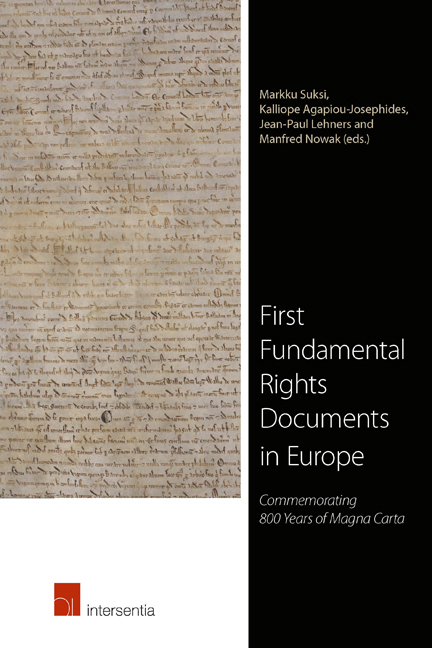Book contents
- Frontmatter
- Preface
- Contents
- List of Authors
- 1 Introduction
- PART I
- PART II
- 11 France: Foundational Importance of the Declaration of 1789
- 12 Sweden: Free Press as a First Fundamental Right
- 13 The Netherlands: The Batavian Staatsregeling as the First Fundamental Rights Document
- 14 Portugal: ‘Tropical Versailles’ in the Beginning of the Nineteenth Century
- 15 Luxembourg: Fundamental Rights in a Small State
- 16 Greece: Reflections from the Hellenic Legal Tradition
- 17 Denmark: In Love with Tradition
- 18 Germany: Fundamental Rights as an Instrument Towards the Rechtstaat
- 19 The Czech Republic: On the Road to Rights and Freedoms
- 20 Romania: The Birth of Fundamental Rights as a Form of Political Contention
- 21 Bulgaria: The Liberal Tarnovo Constitution
- 22 Finland: Rights to Facilitate Participation
- 23 Estonia: First Landmarks of Fundamental Rights
- 24 Slovakia: The Right of a Nation
- 25 Latvia: Second Part of the Constitution as a Project for Next Generations
- 26 The History of Fundamental Rights in Europe: A Long and Winding Road
- Index
12 - Sweden: Free Press as a First Fundamental Right
from PART II
Published online by Cambridge University Press: 15 December 2017
- Frontmatter
- Preface
- Contents
- List of Authors
- 1 Introduction
- PART I
- PART II
- 11 France: Foundational Importance of the Declaration of 1789
- 12 Sweden: Free Press as a First Fundamental Right
- 13 The Netherlands: The Batavian Staatsregeling as the First Fundamental Rights Document
- 14 Portugal: ‘Tropical Versailles’ in the Beginning of the Nineteenth Century
- 15 Luxembourg: Fundamental Rights in a Small State
- 16 Greece: Reflections from the Hellenic Legal Tradition
- 17 Denmark: In Love with Tradition
- 18 Germany: Fundamental Rights as an Instrument Towards the Rechtstaat
- 19 The Czech Republic: On the Road to Rights and Freedoms
- 20 Romania: The Birth of Fundamental Rights as a Form of Political Contention
- 21 Bulgaria: The Liberal Tarnovo Constitution
- 22 Finland: Rights to Facilitate Participation
- 23 Estonia: First Landmarks of Fundamental Rights
- 24 Slovakia: The Right of a Nation
- 25 Latvia: Second Part of the Constitution as a Project for Next Generations
- 26 The History of Fundamental Rights in Europe: A Long and Winding Road
- Index
Summary
INTRODUCTION
In 2016, the 250th anniversary of the Freedom of the Press Act (FPA) will be celebrated in Sweden. This Act is one of the four constitutional laws that together form the Swedish constitution. Although not unchanged, having evolved with developments in society, several of the main principles in the original Freedom of the Press Act have survived to the present day. In this chapter, I intend to identify these core principles and show how important the Act has been for the development of modern Sweden both as a fundament of the society and also as a tool to enable individuals and the media to contribute to public debate.
Even though it is fundamental to Swedes’ understanding of society and a strong constitutional symbol, the Freedom of the Press Act is today facing new challenges as the constitutional landscape changes nationally and internationally. New forms of fundamental rights as granted through the European Convention for the Protection of Human Rights and Fundamental Freedoms as well as the direct applicability of binding (constitutional) European Union law put the Freedom of the Press Act to new tests. These new phenomena are also discussed, or at least touched upon, in this chapter.
THE FREEDOM OF THE PRESS ACT — THEN AND NOW
The history of written constitutions in Sweden can be traced back to the oaths of the medieval kings. As early as the fourteenth century, the oath of the King was an expression of his willingness to serve the people, to treat people alike and to respect the law. For hundreds of years, this promise to the people served as a firm bond between the King and his people. As time passed and Sweden became one country with one King, the King's power started to become a matter of family ties as the Crown was inherited from father to son. Nevertheless, the oath continued to play a role as the custom was that every new King swore an oath to the people. Accordingly, the bond between the King and his people continued to be a true political reality for centuries.
This tradition was, however, promptly put aside when King Karl XII inherited the crown at only 15 years of age in 1697. At the time, Sweden was a huge country, with a territory embracing great parts of Northern Europe and the Baltic Sea.
- Type
- Chapter
- Information
- First Fundamental Rights Documents in EuropeCommemorating 800 Years of Magna Carta, pp. 151 - 162Publisher: IntersentiaPrint publication year: 2015
- 1
- Cited by



